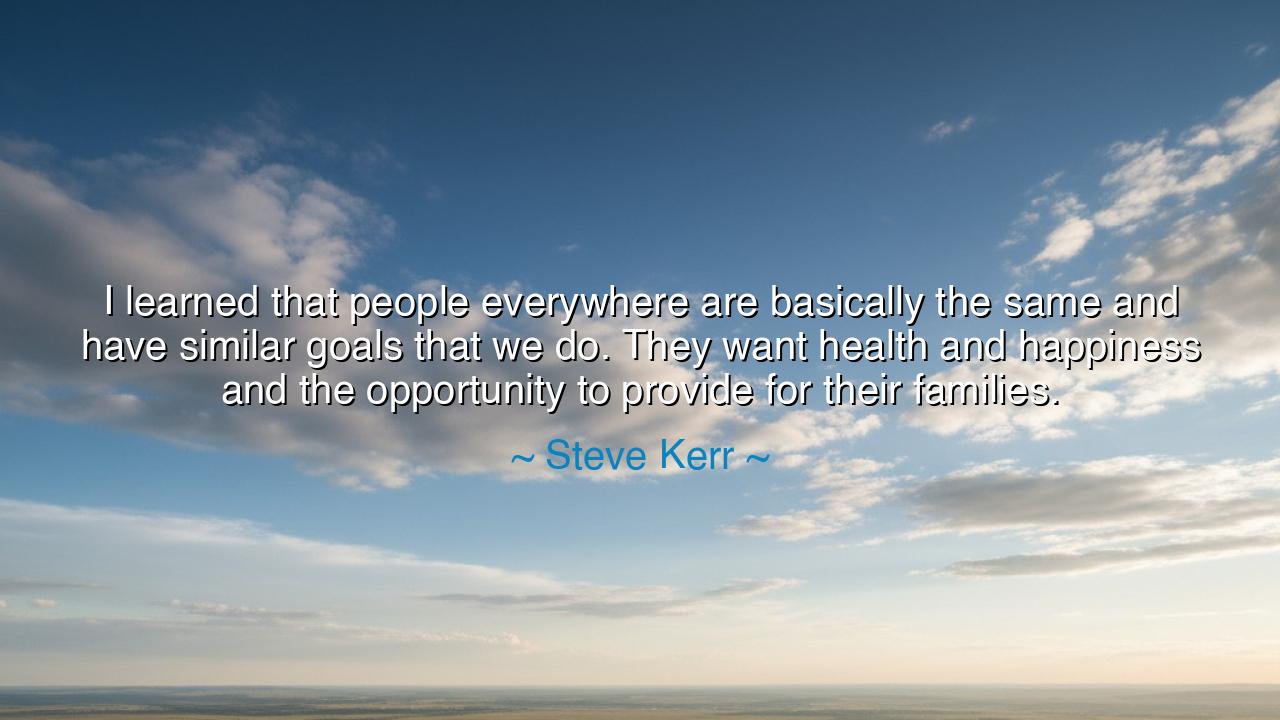
I learned that people everywhere are basically the same and have
I learned that people everywhere are basically the same and have similar goals that we do. They want health and happiness and the opportunity to provide for their families.






The words of Steve Kerr — “I learned that people everywhere are basically the same and have similar goals that we do. They want health and happiness and the opportunity to provide for their families.” — carry the calm, enduring wisdom of a traveler who has seen beyond borders. These are not the musings of a politician or philosopher, but of a man who has walked among many cultures, listened more than he spoke, and found that beneath all differences of color, language, and creed, the human heart beats with the same desires. His words remind us that humanity is not divided by nature, but by misunderstanding — that what binds us is greater than what separates us.
Kerr’s insight arises from a life lived across continents. Born in Lebanon, raised between the Middle East and the West, he grew up in a world fractured by conflict but filled with kindness. He saw tragedy early — his father, Malcolm Kerr, was assassinated while serving as president of the American University of Beirut — yet from that pain grew understanding. Rather than turning bitter, he learned that suffering knows no nationality, and compassion no boundary. The origin of his reflection is therefore both personal and universal: it is the wisdom of a man who has seen humanity in its diversity and recognized that all people seek the same three treasures — health, happiness, and the dignity of providing for one’s family.
In the ancient world, wise men traveled far to reach similar conclusions. The philosopher Herodotus wrote that “custom is king of all,” meaning that while practices differ, the intentions behind them are often the same. The Chinese sage Confucius taught that harmony among men begins when we recognize ourselves in others. Even the Stoics of Greece believed that every person, no matter their homeland, is a “citizen of the world.” Kerr’s words are the modern echo of these truths — that empathy is not an ideal, but a recognition of reality. Humanity is one river with many streams.
To understand this, one might look to history’s turning points. When the Berlin Airlift began in 1948, it was not simply an act of strategy; it was an act of compassion. The American and British pilots who risked their lives to bring food and medicine to a blockaded city did so for strangers. Why? Because they recognized in those hungry children and weary families the same yearning they held for their own. Across walls and ideologies, the shared human longing for survival and dignity triumphed. Kerr’s quote carries that same recognition — that beyond politics, beyond nations, there are only people, and their most sacred hopes are universal.
His words also whisper a challenge to modern ears. In a time when division is shouted from every screen and fear of “the other” grows once more, Kerr’s reflection calls us back to the heart of wisdom: to see ourselves in one another. When we remember that every person seeks health, joy, and the chance to care for those they love, hatred loses its power. The labels of race, religion, and class fall away, and what remains is the simple, unbreakable truth that we are one species, sharing one fragile home.
Yet, like all wisdom, this truth requires action. To live by Kerr’s teaching is to cultivate empathy — to look beyond comfort and habit, to listen before judging, to serve before boasting. It is to build communities, not of sameness, but of shared humanity. In every act of kindness, in every fair policy, in every open mind, we reaffirm what he discovered: that beneath the noise of division, the song of humanity still sings the same refrain — health, happiness, and hope.
So, my children, remember this lesson as you walk the path of life: the faces of the world may differ, but the hearts within them do not. Do not fear those who seem unlike you; they too rise in the morning with dreams, and lie down at night with worries. To recognize this is to touch the divine — to see, as Steve Kerr saw, that all men and women are bound by the same sacred thread of longing. And if we honor that bond with compassion, then the peace that seems so distant will one day live among us, not as a dream, but as our shared reality.






AAdministratorAdministrator
Welcome, honored guests. Please leave a comment, we will respond soon